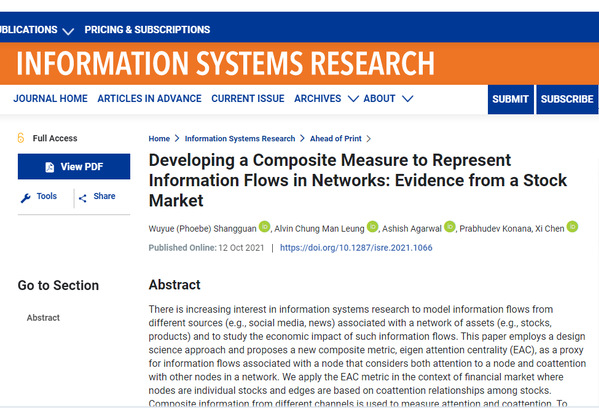事物之间存在各种各样的联系,以这些联系为边、以事物为节点,可以形成一张网络。政府、企业、个体都是这张网络中的节点,几乎没有什么事物可存在于这张网络之外。
这张网络是信息的载体,节点在网络中发散和接受着各式各样的信息。通过信息的传递,这些节点在生活生产中的每一项决策都在影响其他节点,同时又受到网络中其他节点的影响。
通过观察事物间的联系构建网络,以网络化的视角来观察事物之间的信息流,可以帮助我们更好地理解和预测网络中的节点行为。
10月12日,浙江大学管理学院数据科学与管理工程学系主任陈熹教授为通讯作者、厦门大学管理学院博士后研究员上官武悦为第一作者的论文Developing a Composite Measure to Represent Information Flows in Networks: Evidence from a Stock Market于国际期刊Information Systems Research(SCI检索,2020-2021 影响因子 5.207)在线发表。论文以网络化的视角捕捉股票市场中的信息流并研究此类信息流的经济影响。

刊发截图
论文采用设计科学方法,提出了一种新的节点中心性的复合度量指标,即特征注意力中心性(EAC),作为测量与节点相关的信息流的代理变量,该指标同时考虑市场对节点的注意力与市场对网络中其他节点的注意力。分析表明,EAC在预测股票异常收益的方向和幅度方面明显优于其他指标。此外,研究中提出的EAC计算方式相比其他计算方式具有更好的预测效果,并且在预测异常收益方面优于直接注意力。
论文发现,复合信息比单独的信息源具有显着更好的预测性能,这种卓越的性能归功于来自社交媒体而不是传统媒体的信息。
除了学术价值外,该论文也具备较高的应用价值。比如我们可以用这样的视角来观察和研究其他的生产生活活动。比如,以政务服务为节点,以政府服务是否存在共享用户为边,构建政府服务的信息网络,就有可能预测个体对政务服务的需求,实现政府服务的主动推送。
论文的第一作者上官武悦,现任厦门大学管理学院博士后研究员,博士毕业于浙江大学管理学院,师从陈熹教授。该论文是上官武悦博士论文的主要构成部分。据上官武悦介绍,该论文有以下三个创新点:
第一,结合设计科学中的原则,提出了一种网络中节点中心性度量方式EAC(特征注意力中心性),除了关注网络中的连接之外,也关注网络中的信息内容。
第二,使用社交媒体去预测股票趋势,并证明了社交媒体中的“共注意力”比“直接注意力”能带来更大程度上的预测收益提高,为信息系统和金融领域的相关研究做出了补充和扩展。
第三,使用多种方法评估EAC的效果,并证明该方法比现有的节点中心性度量方式有更强的预测能力。
附:论文摘要与原文链接
Abstract
There is increasing interest in information systems research to model information flows from different sources (e.g., social media, news) associated with a network of assets (e.g., stocks, products) and to study the economic impact of such information flows. This paper employs a design science approach and proposes a new composite metric, eigen attention centrality (EAC), as a proxy for information flows associated with a node that considers both attention to a node and coattention with other nodes in a network. We apply the EAC metric in the context of financial market where nodes are individual stocks and edges are based on coattention relationships among stocks. Composite information from different channels is used to measure attention and coattention. To evaluate the effectiveness of the EAC metric on predicting outcomes, we conduct an in-depth performance evaluation of the EAC metric by (1) using multiple linear and nonlinear prediction methods and (2) comparing EAC with a benchmark model without EAC and models with a set of alternative network metrics. Our analysis shows that EAC significantly outperforms other measures in predicting the direction and magnitude of abnormal returns of stocks. Besides, our EAC specification has better predictive performance than alternative specifications, and EAC outperforms direct attention in predicting abnormal returns. Using the EAC metric, we derive a stock portfolio and develop a trading strategy that provides significant and positive excess returns. Lastly, we find that composite information has significantly better predictive performance than separate information sources, and such superior performance owes to information from social media instead of traditional media.
https://doi.org/10.1287/isre.2021.1066






